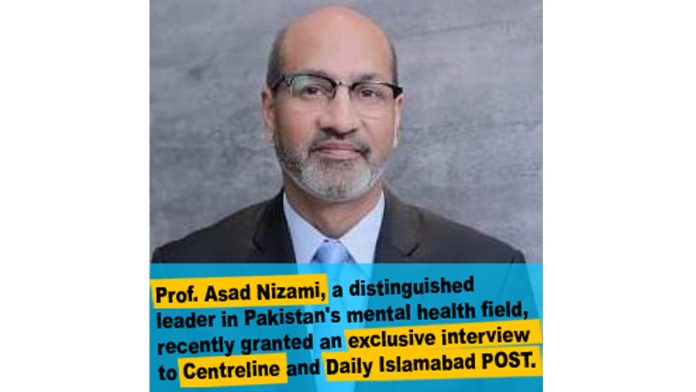Prof. Asad Nizami, a distinguished leader in Pakistan’s mental health field, recently granted an exclusive interview to Centreline and Daily Islamabad POST. Below is the complete text of his interview.
INTERVIEW
Ansar Mahmood Bhatti
1: What inspired you to become a psychiatrist, and what motivate you to continue in this field?
My journey into psychiatry began back in medical college at Rawalpindi Medical College – now Rawalpindi Medical University. Over those five years, I found myself deeply fascinated by the human brain above all one organs. While studying the human body and its various organs, the brain stood out to me as uniquely complex and enigmatic. This brain was unlike any other, holding layers of mystery and the incredible capacity to shape thoughts, emotions, and behavior. My fascination only grew stronger after graduation during my year long house job, where my interest in neurology solidified.
I owe a great deal to my mentor and teacher, Professor Malik Hussain Mubasher, the founder of the Institute of Psychiatry, which he established in 1973. His guidance and the foundation he laid for the field of psychiatry has left an enduring legacy, now completed its 51 years of excellence. Inspired by Professor Mubasher, I realized that psychiatry offered a distinct approach to understand the brain and human behavior.
What drew me to psychiatry was the diversity and complexity of the challenges that the human mind presented. Each person brought a new kind of problem, and each required a unique solution. This challenge has kept me engaged and motivated in my specialty; My fascination with the human mind and the constant learning in mental health have become a lifelong commitment.
What aspects of psychiatry do you find most rewarding and which do you find most challenging?
Historically, decades ago, people often believed they understood the causes of all kinds of illnesses. If someone had a fever or tuberculosis, there was usually a tangible explanation. However, when someone exhibited unusual behaviors – waking up shouting, being abusive, or acting erratically – people attributed it to a supernatural influence.
Mental health has long been stigmatized. Over time, though, we’ve progressed from viewing it solely through the lens of psychiatry to a broader understanding of mental well-being. For example, it wasn’t until 2001 that the WHO released its first comprehensive report on mental health. Before that, there was limited understanding of how to support people with mental health issues on a global scale. While the stigma around mental health persists, it has lessened considerably.
In Pakistan, the mental health field still faces significant challenges. There are only about 900 psychiatrists in a country with a population exceeding 220 million – far fewer than required. With the rising prevalence of mental health issues, this is a very low ratio. One of the main reasons for this shortage is the career preferences of medical students. Many aspire to become surgeons, medical specialists, or gynecologists rather than choosing psychiatry.
4: What are your primary objectives for organizing the International Psychiatry Conference 2024 Islamabad?
The Pakistan Psychiatric Society’s International Conference occurs biennially, rotating through each of the six regional chapters. This year, from November 22nd to 24th, the Institute of Psychiatry at Rawalpindi Medical University is honored to host this prestigious gathering.
One key question we always face is: what are the tangible outcomes of these conferences? Are we producing results that drive meaningful change? This time, we aim to achieve that. The theme I proposed over a year ago, “From Mental Health to Global Mental Health,” focuses on building connections and collaboration across sectors. Mental health cannot function in isolation – it requires integrated efforts with Governmental, the World Health Organization, Health and Education sectors, NGOs, and other related organizations.
What makes this year’s conference unique is its outcome-oriented approach. Each session will culminate in a policy document. For instance, a session on public mental health will not just end with discussions but it will generate recommendations and actionable policies. Each session chair will draft these documents with support from the Ministry of Planning, Development and Special Initiatives, with the goal of embedding these ideas into Governmental Policy.
Our sessions will cover diverse topics, from creative and innovative mental health strategies to addressing controversies. We’ll explore pressing issues related to legal frameworks, such as sentencing and care for individuals with mental illnesses. Hot-button topics like the impact of mental health on issues of sexual identity, and difficulties faced by marginalized communities, will also be on the table.
The COVID-19 pandemic highlighted the importance of mental health outreach, and we now understand that remote support is vital. This conference seeks to capitalize on these insights, uniting experts to discuss sustainable, effective mental health solutions. We aim for actionable outcomes that the Government can champion and incorporate into long-term Policies.
To foster a comprehensive perspective, we’ve invited Ambassadors from various Embassies in Pakistan, offering them insight into mental health challenges both globally and within our region. With support from the planning division, we aim to implement a 10-year National Mental Health Policy to promote sustained improvements in mental healthcare nationwide.












